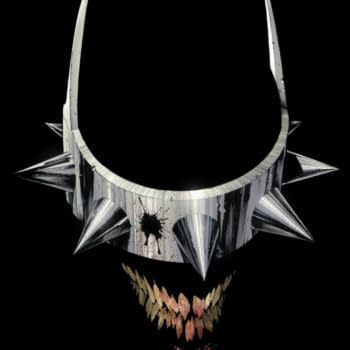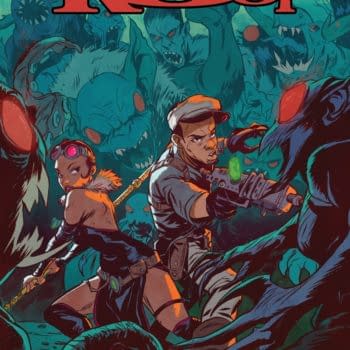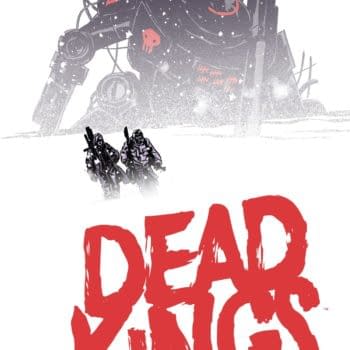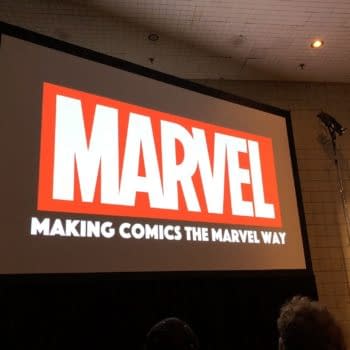Posted in: Movies | Tagged: film, HRL
Why Fans Would Lose Out If Disney Buys Fox And The X-Men And Avengers Film Franchises Merge
Fans all over the internet seem excited about the prospect that Disney may buy out 20th Century Fox's film and TV assets because it would mean the X-Men and Fantastic Four could return to the full ownership of Marvel, which is taken as unquestionably a good thing.
They are dead wrong. Yeah the X-Men, Fantastic Four and the Avengers could meet in a big movie. I think that would have probably happened eventually anyway. But this deal would lead to less Marvel movies and less obscure characters getting a chance to shine.
First off, some history on the Fox/Marvel rights sale. Marvel sold the film and a portion of the merchandising rights of the X-Men characters to 20th Century Fox in 1993. While that sale might have been a terrible one for Marvel, it has been great for fans.
In fact the whole golden age of superhero movies (and of Marvel movies in particular) can be traced back as being a direct consequence of that crummy deal, which has also had pivotal importance to the comic book market and to the recent development of Marvel Comics itself.
I interviewed Chris Claremont at NYCC in 2016 and in typical craven Bleeding Cool manner, tried to get on his good side and set him up for some ego stroking by asking him:
"When you started [writing] X-Men the series was close to cancellation, and over the 16 years you wrote the book it became Marvel's leading franchise. Your X-Men #1 from 1991 remains, I think, the highest selling American comic ever. But in the last few years the X-Men have faded a little and they are no longer the industry's top sellers, what advice would you give Marvel to get them back on top?"
Claremont refused to take the bait and make it about himself:
"That has nothing to do with comic sales, that has everything to do with the fact that the film rights are controlled by a rival corporation. I guarantee you that if 10 years ago, when Marvel was approached by Disney, if the X-Men film rights were owned by Marvel Studios and not Fox the X-Men would probably still be the paramount book in the canon. The reason for the emphasis on the other titles is because Marvel / Disney control the ancillary film rights whereas all the film rights for the FF- the Fantastic Four – and the X-Men are controlled by Fox who has no interest in the comic books.
So I think the corporate publishing attitude is: 'why would we go out of our way to promote a title that will benefit a rival corporation's films when we could take that same energy and enthusiasm and focus and do it for our own properties?'"

I think this take is absolutely correct. Tom Brevoort, who has been one of Marvel's leading editors for over 20 years, wrote a memo in 2004 (once published on his Marvel Blog, now lost to the internet ether) urging Marvel to focus its promotional energy — including press, creators, and characters on its Avengers line, as that was where the corporation stood to gain the most. This memo came as Marvel was securing funding from Merrill Lynch to launch its own movie studio which was to exploit Marvel's leftover character licences — mainly The Avengers — Iron Man, Captain America, and Thor.
These characters are now so prominent that it's easy to forget how forlorn they were throughout the '90s. With the X-Men ascendant and Marvel editorial in chaos with firings and bankruptcy, the Avengers characters suffered through terrible creators and turgid storylines (anyone remember The Crossing?). Brevoort was part of a temporary revival in the late '90s with the Heroes Return promotion, but even that turned out to be a temporary blip. The X-Men characters were the top sellers, so they inevitably attracted the most attention, promotion, and top creators.
However within months of Brevoort's memo and with the Merrill Lynch financing deal secured, the Avengers line was relaunched with Marvel's top creators. Brian Bendis and David Finch produced the biggest title of the year: New Avengers, with for the first time Wolverine and Spider-Man (unquestionably Marvels biggest characters) as regular team members. The decline of the X-Men line can be roughly traced to the same period as Marvel's editorial focus abruptly moved from them to the Avengers characters.

When the Netflix deal to produce the Daredevil, Jessica Jones, Luke Cage, Iron Fist and Defenders series was first announced in 2013, Disney head Bob Eiger called the characters "not among the most popular." However, Iron Man — the most successful of all the movie characters — was in his pre-movie history less popular or successful than Daredevil (in fact, in the '70s before Frank Miller's seminal run on Daredevil, Marvel contemplated merging the two titles into one where DD would be the lead).
Iron Man's recent popularity comes from the films — most crucially Robert Downey Jr's portrayal of the character. If Marvel's focus had been put on another character with similar potential (like, say, maybe Daredevil), they might have been just as successful.
If Marvel had not made the deal with Fox and had kept the X-Men rights, then we might never have seen an Iron Man movie. He was a less successful character and a bigger risk than another X-Men, X-Force, Wolverine, or even Deadpool movie might have been. Certainly a Doctor Strange, Guardians of the Galaxy, or Black Panther movie would have been much less likely.
But Marvel did not own those rights, which meant that we got the Avengers — and even more peripheral character movies (I mean Ant-Man, guys!) — in addition to the X-Men movies produced by Fox.
Part of the logic of these type of buyouts is that they will increase profits by removing competition. The companies will never admit to this for anti-trust reasons, but it's clearly a motive, often cited by analysts as a positive reason for investors to support these deals.
Marvel studios produced three movies this year (Guardians of the Galaxy Vol. 2, Spider-Man: Homecoming, and Thor: Ragnarok) with the same number planned for 2018 and 2019. These include Marvel's co-production with Sony on the Spider-Man films, which don't really qualify as Disney movies. Marvel had previously only released a maximum of two movies in one year, suggesting they are about reaching their capacity for production.
Fox has only gotten around to properly exploiting their X-Men licence recently, but with the success of Deadpool, they have ambitious plans to release several X-Men movies a year. X-Men: Dark Phoenix, Deadpool 2, and New Mutants are all currently in simultaneous production, while X-Force and Gambit are in development.
So if Disney buys Fox, what happens? It's hard to imagine that they will continue to produce so many movies. Perhaps Marvel could increase their production schedule to four movies a year — but even that may be a stretch, with the potential that they could cannibalize their own audience (not as much a problem when Fox and Disney are in competition). Not to mention, they'd potentially be in box office competition with Disney/Fox's other franchises like Star Wars and Avatar.
So there will be less movies and, naturally those movies will be about the more popular characters. Why take a risk on an obscure (to the general public) character like She-Hulk or Namor when you can just keep making Wolverine, Spider-Man, X-Men and Avengers films?
Would I enjoy seeing the X-Men and the Fantastic Four join the MCU and interact with the other characters? Yes, of course. But the logic of that development exists without this deal. The success of Marvel's Spider-Man: Homecoming movie makes it ultimately inevitable that whoever controls the rights to the X-Men and the FF will see the logic of making a similar deal. But crucially, that deal has not precluded Sony from developing their own Spider-Man spinoffs like Venom or Black Cat and Silver Sable — in fact, its success has made such films more likely.
You may be of the opinion that less superhero movies would be a good thing. Certainly not all these productions will be good, but I don't see how less movies makes better films more likely. This deal would mean fewer movies across the board — not just superhero films — as Disney/Fox consolidates its output. It seems obvious that the more movies there are the more potential there is for unexpected gems like the first Iron Man or Guardians of the Galaxy films.
So those that are cheering on this deal should be aware that while it would likely be very good for Disney's share price, it is fans that ultimately stand to lose out.















